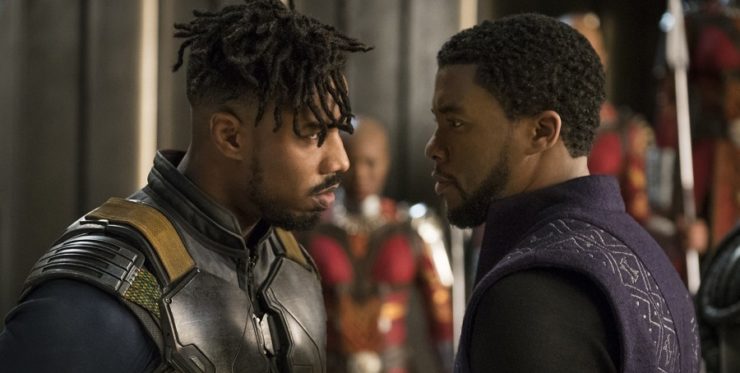Black Panther is a goddamn masterpiece. It’s as anti-imperialist as Taika Waititi’s Thor: Ragnarok with as much commentary on Blackness as Ryan Coogler’s own Fruitvale Station. By no means is it perfect, but it’s deeper than the typical superhero fluff. Coogler offers a fantasy of an independent Africa untainted by colonialism and exploitation, of what we might have had, of what was stolen from us. This is a film of the culture, by the culture, for the culture.
Spoilers ahead. Like, a lot of ‘em. Check out Emmet Asher-Perrin’s spoiler-free review, otherwise get ready to dive into my new favorite Marvel movie.
If Disney/Marvel learns anything from the successes of the two most recent MCU movies, it should be to hire more POC and let them tell their own stories. The script by Coogler and Joe Robert Cole is meticulously nuanced. Cinematographer Rachel Morrison’s striking energy and vibrant palette pairs effortlessly with Coogler’s relentless yet exhilarating direction. The production design, art direction, set decoration, costumes, and makeup put on a gorgeous performance of big budget Afrofuturism. And, of course, the stellar cast is a veritable parade of pan-African excellence. The story being told and those telling it, both in front of and behind the camera, are some of the best the Black diaspora has to offer.
The five tribes of Wakanda each draw inspiration from real cultures. The River tribe’s lip and ear disks come from the Mursi and the Surma, the Border tribe’s Basotho blankets from the Sotho, the Mining tribe cover their hair and skin in otjize like the Himba, the Merchant tribe dress similarly to the Tuareg, and the Jabari borrow from the Dogon. Ramonda’s headdress is a Zulu isicholo, Shuri’s corset from the Dinka, and the scarification comes from tribes across the continent. The agabada (robe worn by Zuri) makes frequent appearances, as do neck rings from the Southern Ndebele, kente cloth, and aggrey beads. The Dora Milaje are similar to the Dahomey Mino, and their armor comes from the Maasai. The Wakandans speak isiXhosa, albeit spoken with a variety of accents. And the first word of the film, “Baba,” means “father” in several African languages.
Coogler also breaks down stereotypes of Africans. In the comics, M’Baku, aka Man-Ape (ugh, I know), was the embodiment of the “Dark Continent” trope. At first, the movie plays up the savage caricature. The Jabari are physically intimidating, grunt like gorillas, dress in tribal wear, and prefer long-handled knobkierie or rungu over vibranium-enhanced weaponry. He believes in the old ways and appears disinterested in anyone outside his clan. But then he cracks that cannibal joke and it all comes tumbling down. While not as polished as T’Challa, M’Baku is no stereotype. He rescues his king, offers shelter to the exiled royals, and rallies the Jabari to the battlefield. In a way, M’Baku is the midpoint between T’Challa’s national self-interest and Erik’s political destabilization. Ultimately, he believes in Wakanda even if he disagrees with the way it’s run. Coogler uses the Jabari to show what it looks like when Wakanda fails to live up to its own utopian hype.
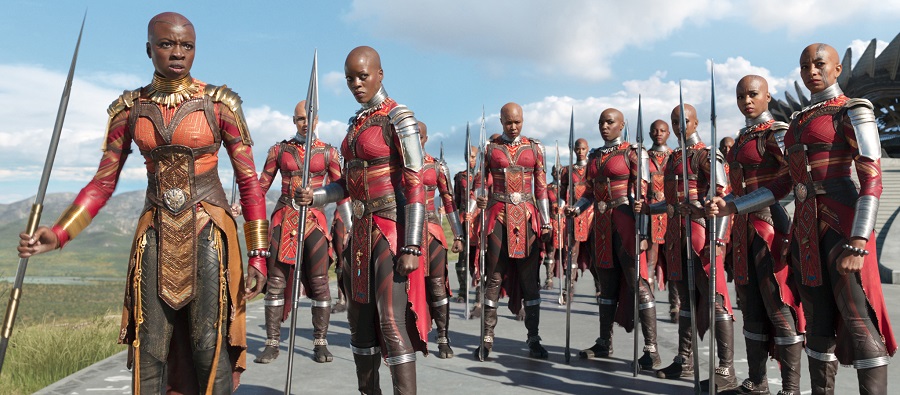
Without the women of Wakanda, Black Panther would fail completely. Dozens of dark-skinned, natural-haired Black women fill the screen, each unique in personality, physicality, and purpose. Ryan Coogler must have taken the DuVernay test as a challenge because Nakia, Okoye, and Shuri outpace T’Challa time and time again. If Disney/Marvel were smart, they’d already have a Dora Milaje spin-off in the works.
Black Panther is in part about fathers and sons, but it comes at the expense of motherhood. Nothing but respect for my president Angela Bassett, but what does Ramonda actually do in the movie besides offering motherly wisdom? Yes, she’s queenly and elegant, and obviously not every woman has to be a warrior goddess or an overachieving genius. But her screen time is mostly concerned with supporting her son’s ascendance to the throne or mourning his death. Clearly she’s vital to the movie and to T’Challa’s evolution, but I wish she was better developed. We know who Ramonda is with regards to her son, but who is she outside of him? Erik’s mother gets even less development. The film cares so little for her that we never even learn her name. After N’Jobu’s murder, did she raise their son alone or was he abandoned to the system? Did she support his vengeance mission or reject his cruelty? Whatever happened to Erik between his father’s death and joining the military had to have some effect on his adult motivations, and his mother is a big part of that missing era.
We also have to talk about straightwashing and the absence of queerness. Pre-colonial African expressions of sexuality and gender were myriad. Since Wakanda was hidden away, it shouldn’t be so heavily influenced by Western social norms of cis- and heteronormativity. Wakanda has gender parity and a seemingly equitable society, but “the gays” is where they suddenly draw the line? At least the comics feature a prominent lesbian relationship. Could there be LGBTQ people in movie!Wakanda? Sure. But if their queerness isn’t portrayed on screen then it’s not representation (*side-eyes J.K. Rowling*). Worse, the studio intentionally excised queer rep. Black Panther not withstanding, diversity in the MCU movies is restricted to a couple women (typically either the damsel, or the girlfriend, or the sidekick), a handful of POC, and a single disabled character. Diversity has to be more than a quota or token representation. If it’s not intersectional, you’re not doing it right.
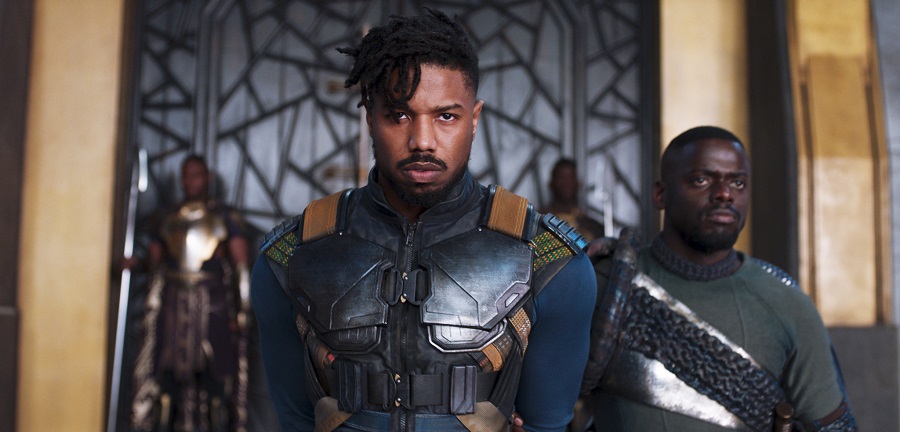
It took until last year’s Spider-Man: Homecoming before the MCU movies featured an adversary who was an antagonist rather than a supervillain, a character whose motivations are understandable if hard-hearted. Coogler doubles down with Killmonger, a man fueled by righteous fury and toxic masculinity. A lesser film would have stopped at Erik’s jealousy over his cousin’s power and privilege, but Coogler adds in commentary on the War on Drugs, redlining, race riots, police brutality, and the New Jim Crow. Oakland isn’t important to the story just because Coogler (and Michael B. Jordan!) grew up there. It’s also the home of the Black Panther Party, which is what makes that final exchange between the boy and T’Challa in the basketball court so note-perfect. Erik’s worldview is molded as much by his life as a poor African American boy in Oakland as it is by his paramilitary training. T’Challa believes we do for our own, and Erik that we take what we think we’re owed. To oversimplify it, both fight for the same goal of freedom but in wildly different ways.
Simmering underneath all this are the cultural, social, spiritual, economic, and historical tensions between Africans and African Americans. We don’t share the same history but we do have a shared heritage. Twice T’Challa has visions of his ancestors in a dreamlike version of Wakanda, but Erik becomes a little boy listening to his father’s stories in their Oakland apartment. T’Challa can commune with his ancestors all the way back to the first, but Erik, like most African Americans, is limited to recent history. When African Americans look to our past, we see the blood mixed into the bricks that built this nation, the soil watered with our ancestors’ sweat and tears, and the bones ground to dust beneath centuries of oppression. Africa hovers in the distance, a homeland that’s no longer home. Erik cannot go back to the life he had in Oakland, nor can he stay in Wakanda. With his last words he settles in the liminal space: “Bury me in the ocean, with the rest of my ancestors who jumped ship because they knew death was better than bondage.”
And so we have the uncomfortable reality behind his actions. Wakanda has been powerful and technologically advanced for centuries yet did nothing while their neighbors were raped, tortured, enslaved, and slaughtered. War Dogs enact small change—like Nakia rescuing those girls from human traffickers—but the brutal system remains intact. Erik’s violence begets more violence, but so too does Wakanda’s inaction. Like MLK said, “He who passively accepts evil is as much involved in it as he who helps to perpetrate it. He who accepts evil without protesting against it is really cooperating with it.” Wakanda insists it was defending its people, but by claiming neutrality they chose to let their kin die. Imagine how vastly different the world would be if they had stopped the Atlantic slave trade in its infancy. The whole African continent would be covered in Wakandas. Instead, they sat behind their towering walls as blood pooled around them like a moat.
But the film posits a third option beyond the duality of slaughter and secrecy: Nakia. She harbors both the desire to help the exploited and stop the oppressors and the will to protect and tend to her people. Erik’s philosophy of revolution is chained to his toxic masculinity and T’Challa’s utopian dream rests on a bed of isolation and lies, but Nakia has no such limitations. She exhibits the best truths of each man but without the patriarchal bullshit weighing her down. If Wakanda’s past is T’Challa and its present Erik, then its future is Nakia. Killmonger loses the battle over Wakanda’s people to Black Panther, but Nakia wins the war for its spirit. She inspires T’Challa to give that UN speech and set up the Oakland center. Nakia is the true hero of Black Panther.
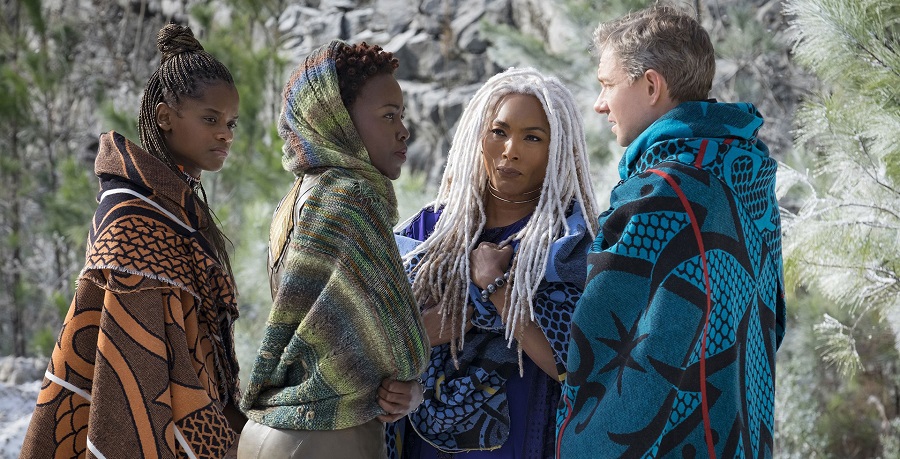
I want to touch on one final point: white people. I know there aren’t a lot of white folks in this movie, and some of y’all are having a hard time with that. But look, you’ve got Everett Ross! No, I’m not being sarcastic. From one angle, his character is very problematic. Here’s a CIA agent wedging his way into a fight he isn’t involved in because he unilaterally decided it benefits his (or America’s) interests. Nor does Ross ever apologize for his employer’s role in turning Erik from a lost boy into a heartless killer. The West and the CIA have intentionally and repeatedly destabilized nations for centuries. All Erik had to do was run his own game of exploitation on the oppressors then turn around and use their resources against them.
Yet I saw Ross’ arc as an example of how to be a good white ally. From the second he wakes up in Shuri’s lab, he defers to the Wakandans. He doesn’t “well, actually” or whitesplain. Instead he follows Ramonda, Shuri, and Nakia’s lead, listening and learning. When Shuri tells him what to do, he complies without challenging her authority. The only time he ignores her command is when she tells him to flee the lab before it’s destroyed. Ross instead uses the skills he earned with his privilege to fight a smaller battle so the Wakandans can focus on bigger issues. Allyship is more than having a Black Lives Matter profile pic. You have to be willing to do the work even when it means standing up to a system you directly benefit from, and you have to be willing to let marginalized people control the narrative. His actions don’t change the fact that Everett Ross is the heir to colonizers and a destabilizer of nations, but he still stepped up. And I say that knowing full well the next movie will undo all of Coogler’s efforts with Ross.
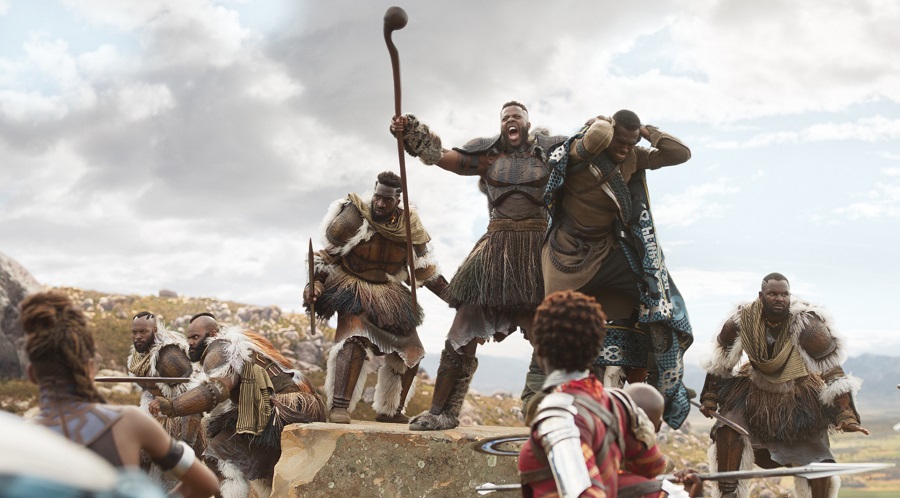
Disney/Marvel has another thing coming if they think I’ll accept more mayonnaise scraps after the Black excellence of Black Panther. It eschews MacGuffins, red herrings, mystery boxes, and CGI supervillains in favor of bitter truths and hard conversations. Even as the film cruises on a predictable plot, everything else is an ode to Blackness. I want so desperately to believe this is the start of something new even as the critic in me doubts it will be. That being said, given its massive opening week ($404 million and counting) excuses for continuing down a path where white men are the default are rapidly dwindling.
What Black Panther achieves—grafting onto a big, dumb tentpole flick an exploration of race and racism, identity, family, faith, the Black diaspora, moral complicity, inequality, and community responsibility—is nothing short of stunning. As flawed as it is, its weaknesses are easily overpowered by its strengths. Coogler said he wanted to make a movie where Black people could see ourselves as more than a stereotype. In that he didn’t just succeed, he rewrote the entire superhero genre. The only other time I was so deeply moved by a comic book movie was in Wonder Woman. There I cried, but Black Panther had me hollering and cheering. I got to sit in a theatre full of my kin, everyone donning dashikis, Coming to America regalia, and other pan-African testaments, and together we reveled in the joy crafted by Coogler and co. I want to see it again and again and again and again and again.
Alex Brown is a YA librarian by day, local historian by night, pop culture critic/reviewer by passion, and QWoC all the time. Keep up with her every move on Twitter, check out her endless barrage of cute rat pics on Instagram, or get lost in the rabbit warren of ships and fandoms on Tumblr.










